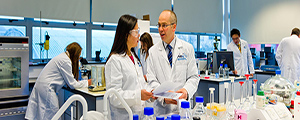































Just about two years ago, Aidan McGrath, Pat Cluney, and Jerry Horgan found themselves in a dilemma. The infrastructure of the network at Waterford Institute of Technology needed an upgrade. The dilemma was whether to simply upgrade what was in place and keep IT running as usual, or be bold, and use this opportunity to transform their network to meet long-term networking needs. They knew they couldn't sustain what they were doing in the long run. They were spending hours and days on repeated routine network management when their time could be better spent in innovation and planning. When they learned about what the Cisco Digital Network Architecture could do for them, the decision was clear.
"We are very happy that we chose to upgrade our network with Catalyst 9K switches and wireless access points and implemented Cisco SD-Access and Cisco DNA Assurance solutions. Our startup companies appreciate the security and mobility the network provides, and I get actionable insights on devices and users on the network that helps me run the network more efficiently"
~Dr. Aidan McGrath, IT Manager, Waterford Institute of Technology, Waterford, Ireland
Waterford Institute of Technology (WIT) is based in Waterford, Ireland. WIT has a student population of approximately 9,000 full and part-time students, and over 1,000 faculty and support staff. In addition to academics, the institute also offers incubation facilities for start-up companies offering them shared workspace and secure infrastructure to grow.

Aidan, Pat, and Jerry pride themselves at running an inclusive network. A network that they have built to fulfill the needs of each user and provide them the best experience possible. Students expect an always-on always available network for personal and academic use, and the team works diligently to make sure the network rises to meet these new challenges. Start-up companies in the incubation center need to protect their data and yet still give their users the freedom to securely access it from anywhere. This can be critical to their success.
The team was looking for a solution that would let them scale their offerings to serve their growing communities. They wanted a quick way to bring startups onboard in a secure manner without having to do a lot of manual work. They wanted to be able to serve their students, staff, faculty, visitors, and guests with quick access to the network, and monitor their experience so they could quickly and decisively remedy any issues they found.
That is when they learned how Cisco Digital Network Architecture (Cisco DNA) based on intent-based networking (IBN) principles could help. Cisco DNA is designed to use a software approach to streamline IT operations by intelligently automating, assuring, and securing network operations so that the administrators can focus more on high-value business work and less on reactive, manual network operations.
After a few months of learning, experimenting, testing, and staging, they deployed Cisco SD-Access and Cisco DNA Assurance, two Cisco DNA solutions.
| Waterford Institute of Technology | ||
| Vertical: Education, Geo: Ireland | ||
| Challenge | Solution | Result |
| ? Provide an open and yet secure network for startup companies and students ? Reduce time and effort for provisioning, monitoring, and troubleshooting | ? Catalyst 9300, 9400, and 9500 switches ? Catalyst 9100 wireless access points ? Cisco DNA Center, with Cisco DNA Assurance ? Cisco ISE ? Cisco SD-Access | ? Time and costs associated with policy management decreased from several days to 30 minutes ? Users are more productive because when issues arise, they are solved more quickly |
I recently caught up with them to hear their story firsthand.

Jerry described to me how, before deploying SD-Access, he had to painstakingly plan out segmenting the network using complex configurations on firewalls, VLANs on switches, and restricting traffic using ACLs, taking several days of his time and effort to get a new company onboard. These companies have confidential data that they need to protect and require extensive networking controls and security to protect their intellectual property.
With SD-Access, he said, they could easily form a new group, assign company members to the group, and segment the network with a simple drag-and-drop GUI. 30 minutes -that's all it took. And best of all, he doesn't even have to get involved; he trusts the work to his subordinates and Cisco DNA Center.
Pat described his challenge: provide the best possible networking services to the 10,000+ people who used it every day. In an academic environment with a relatively open network, it is hard to restrict what gets added to the network and so visibility into connected devices is crucial. Cisco Stealthwatch helps him keep an eye on things. He related to me an instance where an unauthorized host was brought on to the network. This host was caught by Cisco Stealthwatch when it started behaving suspiciously by connecting with external servers. Stealthwatch alerted Pat in time and he could take the offending host offline before it could do any damage.

Pat appreciates how Cisco DNA Assurance gives him deep insights into network activity and the analysis he can depend on to pinpoint the root cause of any issues it detects and the guidance it provides on how to fix them. With the Device 360 and Client 360 dashboards in Cisco DNA Center he can monitor each users' network experience -their connectivity status, application experience, etc. -and determine whether it is their device or the network that may need adjustment for best performance.

Aidan and his team are not stopping there. They continue to explore how they can use the many capabilities of Cisco DNA to further advance their network. Case in point: edge computing. A feature now supported in Cisco DNA, edge computing lets you run applications on a network device close to the clients. That way common computations, such as DNS lookups, can be handled right there without having to continuously backhaul such packets to central servers. You save time and additional traffic on your potentially expensive, links.
Reminiscing on his decision from two years ago, Aidan says, "We are very happy that we chose to upgrade our network with Catalyst 9K switches and wireless access points and implemented SD-Access and Cisco DNA Assurance solutions. Our startup companies appreciate the security and mobility the network provides, and I get actionable insights on devices and users on the network that helps me run the network more efficiently". He continues, "Cisco DNA frees all of us to focus on more strategic tasks."
So, the next time you are at Waterford, make sure to visit the Institute, take a campus tour, and experience the network for yourself!
Check out some of our other stories on higher education:
Resources
 Etiquetas calientes:
#CiscoDNA
Cisco DNA
Cisco DNA Center (en inglés)
#intentbasednetworking
Cisco DNA Assurance
#CiscoDNACenter
#CiscoSDAccess
#CiscoDNAAssurance
#WaterfordIT
Etiquetas calientes:
#CiscoDNA
Cisco DNA
Cisco DNA Center (en inglés)
#intentbasednetworking
Cisco DNA Assurance
#CiscoDNACenter
#CiscoSDAccess
#CiscoDNAAssurance
#WaterfordIT